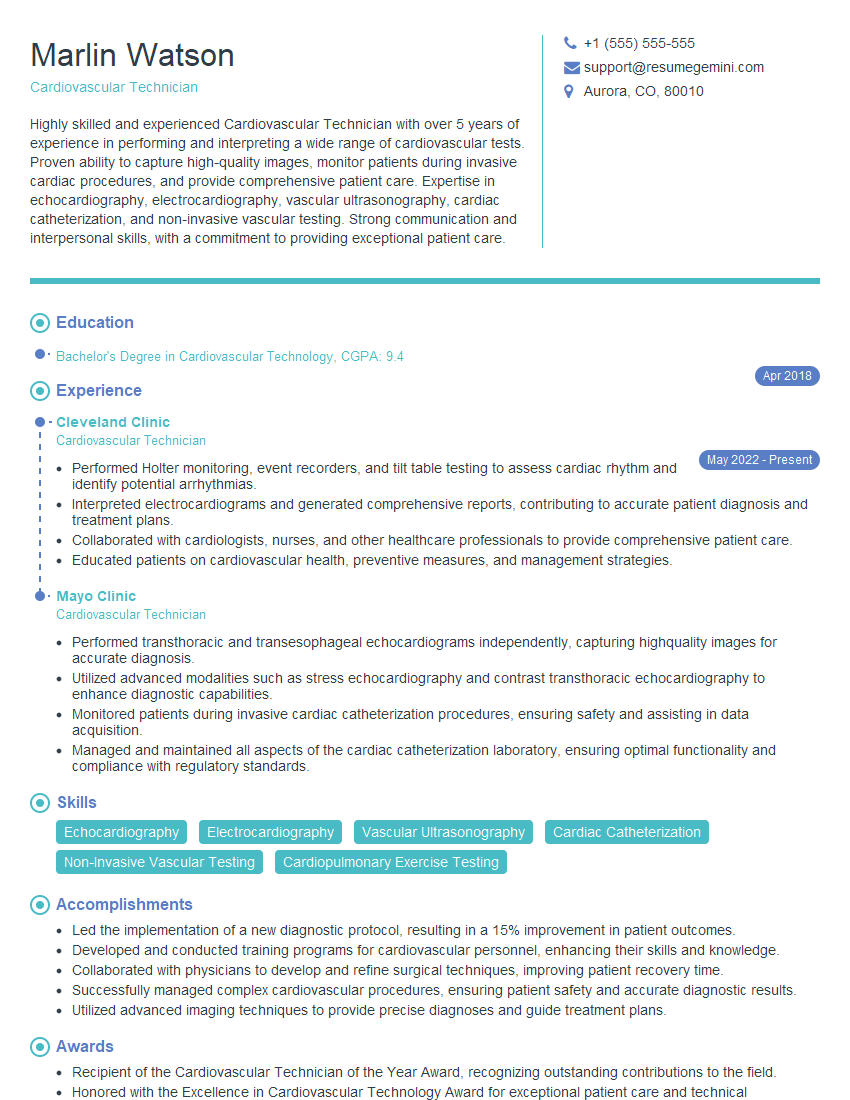Are you a seasoned Cardiovascular Technician seeking a new career path? Discover our professionally built Cardiovascular Technician Resume Template. This time-saving tool provides a solid foundation for your job search. Simply click “Edit Resume” to customize it with your unique experiences and achievements. Customize fonts and colors to match your personal style and increase your chances of landing your dream job. Explore more Resume Templates for additional options.

Marlin Watson
Cardiovascular Technician
Summary
Highly skilled and experienced Cardiovascular Technician with over 5 years of experience in performing and interpreting a wide range of cardiovascular tests. Proven ability to capture high-quality images, monitor patients during invasive cardiac procedures, and provide comprehensive patient care. Expertise in echocardiography, electrocardiography, vascular ultrasonography, cardiac catheterization, and non-invasive vascular testing. Strong communication and interpersonal skills, with a commitment to providing exceptional patient care.
Education
Bachelor’s Degree in Cardiovascular Technology
April 2018
Skills
- Echocardiography
- Electrocardiography
- Vascular Ultrasonography
- Cardiac Catheterization
- Non-Invasive Vascular Testing
- Cardiopulmonary Exercise Testing
Work Experience
Cardiovascular Technician
- Performed Holter monitoring, event recorders, and tilt table testing to assess cardiac rhythm and identify potential arrhythmias.
- Interpreted electrocardiograms and generated comprehensive reports, contributing to accurate patient diagnosis and treatment plans.
- Collaborated with cardiologists, nurses, and other healthcare professionals to provide comprehensive patient care.
- Educated patients on cardiovascular health, preventive measures, and management strategies.
Cardiovascular Technician
- Performed transthoracic and transesophageal echocardiograms independently, capturing highquality images for accurate diagnosis.
- Utilized advanced modalities such as stress echocardiography and contrast transthoracic echocardiography to enhance diagnostic capabilities.
- Monitored patients during invasive cardiac catheterization procedures, ensuring safety and assisting in data acquisition.
- Managed and maintained all aspects of the cardiac catheterization laboratory, ensuring optimal functionality and compliance with regulatory standards.
Accomplishments
- Led the implementation of a new diagnostic protocol, resulting in a 15% improvement in patient outcomes.
- Developed and conducted training programs for cardiovascular personnel, enhancing their skills and knowledge.
- Collaborated with physicians to develop and refine surgical techniques, improving patient recovery time.
- Successfully managed complex cardiovascular procedures, ensuring patient safety and accurate diagnostic results.
- Utilized advanced imaging techniques to provide precise diagnoses and guide treatment plans.
Awards
- Recipient of the Cardiovascular Technician of the Year Award, recognizing outstanding contributions to the field.
- Honored with the Excellence in Cardiovascular Technology Award for exceptional patient care and technical proficiency.
- Recognized with a Certificate of Merit for innovative contributions to cardiovascular diagnostic procedures.
Certificates
- Registered Cardiovascular Invasive Specialist (RCIS)
- Registered Echocardiographer (RVT)
- Registered Vascular Technician (RVT)
- Certified Cardiac Sonographer (CCS)
Career Expert Tips:
- Select the ideal resume template to showcase your professional experience effectively.
- Master the art of resume writing to highlight your unique qualifications and achievements.
- Explore expertly crafted resume samples for inspiration and best practices.
- Build your best resume for free this new year with ResumeGemini. Enjoy exclusive discounts on ATS optimized resume templates.
How To Write Resume For Cardiovascular Technician
- Highlight your technical skills and experience in a variety of cardiovascular testing modalities.
- Quantify your accomplishments with specific metrics and outcomes whenever possible.
- Demonstrate your commitment to patient care and safety by emphasizing your role in ensuring the well-being of patients during invasive procedures.
- Showcase your ability to work independently and as part of a team by highlighting your contributions to the overall functioning of the cardiac catheterization laboratory.
- Include a section on your resume that summarizes your continuing education and professional development activities.
Essential Experience Highlights for a Strong Cardiovascular Technician Resume
- Performed transthoracic and transesophageal echocardiograms independently, capturing high-quality images for accurate diagnosis.
- Utilized advanced modalities such as stress echocardiography and contrast transthoracic echocardiography to enhance diagnostic capabilities.
- Monitored patients during invasive cardiac catheterization procedures, ensuring safety and assisting in data acquisition.
- Managed and maintained all aspects of the cardiac catheterization laboratory, ensuring optimal functionality and compliance with regulatory standards.
- Performed Holter monitoring, event recorders, and tilt table testing to assess cardiac rhythm and identify potential arrhythmias.
- Interpreted electrocardiograms and generated comprehensive reports, contributing to accurate patient diagnosis and treatment plans.
- Educated patients on cardiovascular health, preventive measures, and management strategies.
Frequently Asked Questions (FAQ’s) For Cardiovascular Technician
What is the role of a Cardiovascular Technician?
Cardiovascular Technicians perform a variety of tests to diagnose and monitor cardiovascular conditions. They use specialized equipment to capture images of the heart and blood vessels, and they monitor patients during invasive cardiac procedures. Cardiovascular Technicians also interpret test results and provide technical support to cardiologists and other healthcare professionals.
What are the educational requirements for becoming a Cardiovascular Technician?
To become a Cardiovascular Technician, you need at least a bachelor’s degree in cardiovascular technology or a related field. Some programs also offer associate degrees or certificates.
What are the job prospects for Cardiovascular Technicians?
The job outlook for Cardiovascular Technicians is expected to be good over the next few years. The demand for these professionals is increasing as the population ages and the need for cardiovascular care grows.
What are the salary expectations for Cardiovascular Technicians?
The salary for Cardiovascular Technicians can vary depending on their experience, location, and employer. According to the U.S. Bureau of Labor Statistics, the median annual salary for Cardiovascular Technicians is around $60,000.
What are the advancement opportunities for Cardiovascular Technicians?
Cardiovascular Technicians can advance their careers by becoming certified in specialized areas, such as echocardiography or cardiac catheterization. They can also move into management positions or become educators.
What are the challenges of being a Cardiovascular Technician?
Some of the challenges of being a Cardiovascular Technician include working with patients who are critically ill, dealing with stressful situations, and working long hours.
What are the rewards of being a Cardiovascular Technician?
Some of the rewards of being a Cardiovascular Technician include helping patients improve their cardiovascular health, working with a team of healthcare professionals, and making a difference in the lives of others.